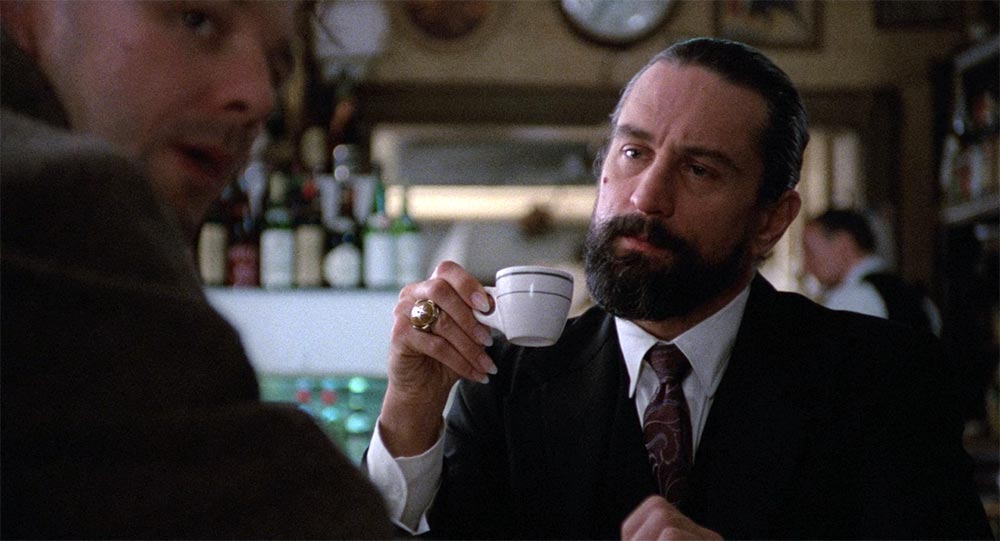The flesh is not only weak in Alan Parker’s Angel Heart (1987), but also corrupted, wet, and sick. Parker’s adaptation of William Hjortsberg’s 1978 Faustian horror novel, Falling Angel, ensnares viewers in a detective thriller that depicts a battle between heaven and hell over one man’s soul. “There’s debt everywhere these days,” DeNiro’s Satan says to private investigator Harry Angel, played by an incredibly charismatic Mickey Rourke.
DeNiro as the Devil is not quite a spoiler since it is foreshadowed from the jump. His name, Louis Cypher, is quite literally a play on Lucifer and DeNiro is not subtle in his delightful performance as the dark prince, adorned with long witchy fingernails, a cane, and a garish beard. Outside of this obvious twist, Angel Heart’s narrative turns are dependent in how audiences read and respond to the racial commentary in the film.
On the surface, the use of Voodoo in Angel Heart plays to the fears of a polite white, racist society that is disturbed by the aesthetic excess of West African and Caribbean cultural practices retained, and celebrated, by Black Americans both in 1955, the film’s temporal setting, and today. Since Harry is a PI, he is routinely imaged as a Mercurial figure, someone on the border between good and evil transmitting messages from the lascivious Black underworld to upstanding white individuals. The cinematography plays to this as DP Michael Seresin and Parker looked extensively at photographs of Segregation in the American South (like the work of Gordon Parks and Robert Frank) to image the physical demarcations that set many of the characters apart in the film.
Angel Heart is most notably remembered for featuring a breakout performance by Lisa Bonet, who radiates with intensity in her supporting role as Epiphany Proudfoot, a character that unfortunately plays into the grossly overused trope of the “wise beyond her years” teenager as a femme fatale. When asked about the conception of her young child, Epiphany informs Harry that she was mounted by the gods in a Voodoo ritual and lost consciousness. While he is perturbed by this, she snorts, “I’m not, it was the best fuck of my life.”
In this sequence, the film acknowledges the difficulty of visualizing the ecstatic experience of submitting oneself to the intrusion of another as separate from the erotization of rape. Like a portent then, blood rains upon Epiphany and Harry as they engage in carnal bliss, mingling with their sweat, spit, tears, and cum—elements that also lie at the root of the racial violence in the film. As Hortense Spillers writes in her seminal 1987 essay “Mama’s Baby, Papa’s Maybe,” racism and violence are not only erotically charged but lie at the very foundation of reproduction and genealogical lineage in the United States. Sex in Angel Heart is not meant to titillate but to unnerve.
Bonet need not worry about what racists would say about her performance in the film because Bill Cosby, who employed and played her father on The Cosby Show, deployed the misogynoir caricature of the hypersexual Jezebel to describe not only her performance, but her personhood on their behalf by running a smear campaign against her. Cosby weaponized respectability politics—the policing of Black lives, bodies, and behavior—to feed directly into the same white flight and fear present in the film that positions Black culture too close to its West African and Caribbean roots as unruly, amoral, and demonic.
Angel Heart positions whiteness as the root of all evil. The murders of the characters of color take after some of the more gruesome sexualized acts of lynching, where genitals are stuffed in mouths or guns shoved inside orifices. Mercifully, all these murders occur off-screen, so the violence comes through in the act of telling. But in telling, the film unearths the depths of hell that Toni Morrison described as the violence of whiteness that is so unbearable that it becomes unspeakable. In Angel Heart, these transgressions of the flesh are so sinister that the Devil has to get involved to sort them out.
Angel Heart screens tonight, August 21, at BAM as part of the series “SWEAT!”



